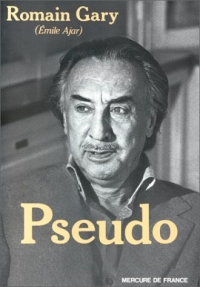 French writer Romain Gary wrote under a pseudonym in order to win a second Goncourt prize, the French equivalent of the Booker, which in theory cannot be awarded more than once to the same author. He managed it, and his pseudonymously-published Life Before Us became an unputdownable timeless classic, as they say.
French writer Romain Gary wrote under a pseudonym in order to win a second Goncourt prize, the French equivalent of the Booker, which in theory cannot be awarded more than once to the same author. He managed it, and his pseudonymously-published Life Before Us became an unputdownable timeless classic, as they say.
Meanwhile, there are other people who wouldn’t mind the Goncourt, but who choose to write under a pseudonym for different reasons. Here is the tale of my short experience of pseudonymous writing (and no, you won’t know what I wrote or what my pen name was): why I did it, what I learned, and how I feel about it now. Wow, said like that it sounds like I’m going to start telling you it was a journey of self-discovery. Don’t worry, I’m not.
Once upon a time, about two years ago, thanks to an illustrator friend, I was asked to write a couple thousand words as a test for a series of children’s novels to be published alongside a magazine. I did it not really thinking I’d get it, but I did, and suddenly there I was signing a (very good) contract and agreeing to follow an absolutely unbending set of rules specifying a set number of words per chapter and a set number of chapters per book and the age of the protagonists and no sex or violence let alone a swearword.
Without getting too much into detail, it was a shamelessly, intensely, voluptuously commercial series of novels. The main issue was the theme. It’s the kind of theme that, in my area of study at least, everyone would label trashy without a second look at it. Ballerina stories, football stories, that sort of thing. So in order not to compromise my future applications for Junior Research Fellowships and postdoc positions (*cough* if you have one of those that needs filling contact me I make very good chocolate cakes *cough*), I decided to take a pen name. I didn’t want the Google Gods to bring up that kind of sulphurous secret on page 1 of ‘clementine beauvais’ just under my Academia.edu profile when I’d become Professor Dame Empress of Intergalactic Children’s Literature at Harvard.
Now, as everyone who knows me knows, I’m a feminist and an active member of the League Against Bunnies and Unicorns in Children’s Literature and it was out of the question for me to stop having convictions just because the cover of the book didn’t mention my real name anywhere. It was genre fiction ‘for girls’, but nothing that was intrinsically sexist – I would have refused immediately. And in fact, following my mum’s advice (what would one do without one’s mum’s advice?), while writing those books I had a lot of fun with the conventions of the genre, respecting some and transgressing a lot. Sometimes the publisher said no, but most of the time they said yes. I ended up writing something I’d never thought I’d write: super-commercial but semi-subversive children’s fiction.
I learned a lot writing these novels. You have to write fast. You have to make your descriptions short, compact and evocative. You have to find new things for the protagonists to do, all the time. And above all, you have to plan ahead. Plan, structure, scaffold. Find ways of solving three problems while creating a new one in just one chapter.
I also learned to get rid of many of my prejudices on this type of literature (damn, that’s definitely starting to sound like I’m saying it was a journey). When I started writing them, I found the whole experience stressful and even weirdly humiliating. But then I started to enjoy it. And now I can see that it was an incredibly helpful and enriching experience, and I even wonder if I could have written Sesame without it. Sesame isn’t really genre fiction, but it’s action-packed and borrows a lot from different genres. Without the practice of making up adventures and misadventures that fit into 14 chapters of however many words each, maybe I wouldn’t have been able to write it.
And above all I’m quite happy with these little books, which is all the more surprising as I’m generally übercritical of what I write. It is, I think, good genre fiction. Doesn’t mean I’m going to reintegrate them into my bibliography, once again for university-related reasons.
Unfortunately or fortunately, the series didn’t last very long. The novels were sold in plastic wrapping with a magazine, and the cover art and the magazine design were frankly hideous and the magazine completely uninteresting. Can’t say I was too bothered about it – it meant that I was able to stop writing them discreetly at the faculty library and start working more on my thesis and on more ‘intellectual’, ‘gratifying’ fiction-writing. Not to mention it was extremely good money which paid for a completely lovely holiday touring the Loire castles with my boyfriend of the time.
Yet I still have a lot of tenderness for these little books and I’m really happy to have had the chance, pseudonymously, to try new techniques of characterisation, description, structure, and dialogue.
Clem x
NB This is a translation/ adaptation of a post previously published on my French blog.

